高二英语人教版选修8教案:Unit2CloningPeriod2 Word版含解析
高中英语人教版选修8学案Unit2Cloning第2课时
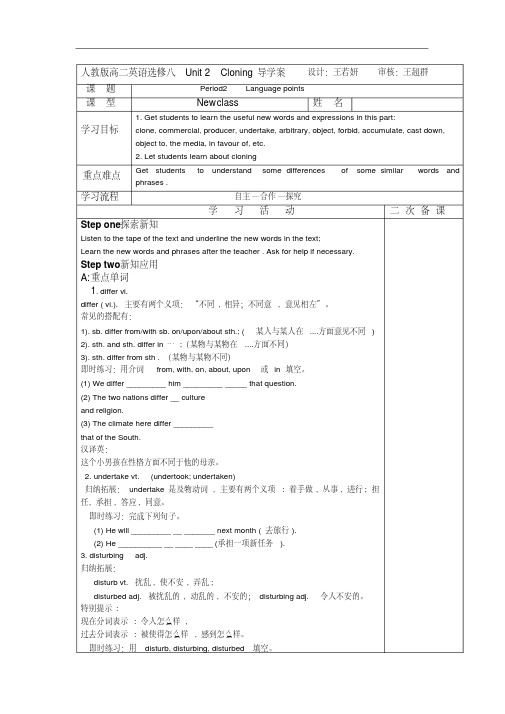
人教版高二英语选修八Unit 2 Cloning 导学案设计:王若妍审核:王超群课题Period2Language points课型New class 姓名学习目标1. Get students to learn the useful new words and expressions in this part:clone, commercial, producer, undertake, arbitrary, object, forbid, accumulate, cast down, object to, the media, in favour of, etc.2. Let students learn about cloning重点难点Get students to understand some differences of some similar words and phrases .学习流程自主—合作—探究学习活动二次备课Step one探索新知Listen to the tape of the text and underline the new words in the text;Learn the new words and phrases after the teacher . Ask for help if necessary.Step two新知应用A:重点单词1. differ vi.differ ( vi.), 主要有两个义项:“不同, 相异;不同意, 意见相左”。
常见的搭配有:1). sb. differ from/with sb. on/upon/about sth.; (某人与某人在....方面意见不同)2). sth. and sth. differ in…;(某物与某物在....方面不同)3). sth. differ from sth .(某物与某物不同)即时练习:用介词from, with, on, about, upon 或in 填空。
人教版选修8Unit2CloningP2教学设计
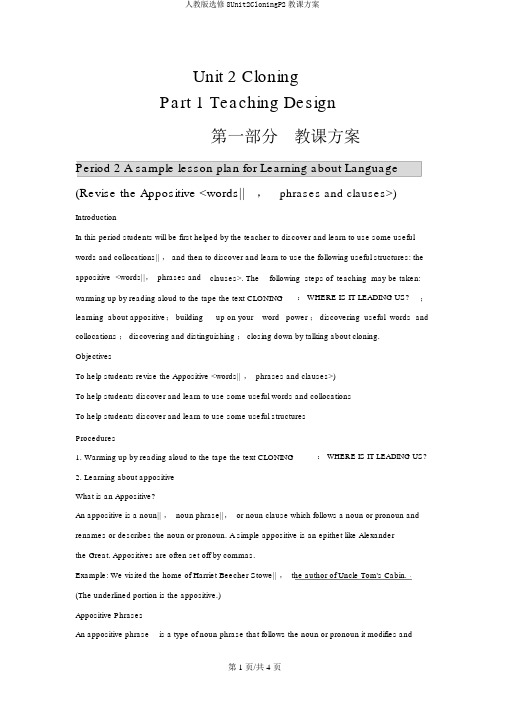
Unit 2 CloningPart 1 Teaching Design第一部分教课方案Period 2 A sample lesson plan for Learning about Language (Revise the Appositive <words||,phrases and clauses>) IntroductionIn this period students will be first helped by the teacher to discover and learn to use some useful words and collocations|| , and then to discover and learn to use the following useful structures: the appositive <words||, phrases and clauses>. The following steps of teaching may be taken: warming up by reading aloud to the tape the text CLONING: WHERE IS IT LEADING US?;learning about appositive; building up on your word power ; discovering useful words and collocations ; discovering and distinguishing ; closing down by talking about cloning.ObjectivesTo help students revise the Appositive <words|| , phrases and clauses>)To help students discover and learn to use some useful words and collocationsTo help students discover and learn to use some useful structuresProcedures1.Warming up by reading aloud to the tape the text CLONING: WHERE IS IT LEADING US?2.Learning about appositiveWhat is an Appositive?An appositive is a noun|| , noun phrase||, or noun clause which follows a noun or pronoun and renames or describes the noun or pronoun. A simple appositive is an epithet like Alexanderthe Great. Appositives are often set off by commas.Example: We visited the home of Harriet Beecher Stowe|| , the author of Uncle Tom's Cabin. (The underlined portion is the appositive.)Appositive PhrasesAn appositive phrase is a type of noun phrase that follows the noun or pronoun it modifies andamplifies or restricts its meaning.Our monitor||, a careful reader and outspoken critic ||, will examine the article before it is handed to the headmaster. [The italicized phrase is an appositive.]Appositive phrases are similar to relative clauses; to avoid wordiness|| , relative clauses can often be reduced to appositive phrases.3. Building up on your word powerTo build up on your word power you are to make sentences with the collocations from the text: CLONING : WHERE IS IT L EADING US? You may try to include as many uses of the Appositive <words|| , phrases and clauses> as possible.1.This is a way of learning English|| , the most popular language in the word.2.People in the future will make an exact copy of themselves.3.We may grow human beings in a laboratory in the near future.4.They are identical in sex and appearance.5.This mysterious thing is produced from coals.6.The natural clones of these plants have two major uses||, one for eating||, one forreproduction.7.At all the time|| , producing commercial quantities of concrete things is difficult.8.We are going on with our research on the cloning of animals.9.The determination and patience of students will be rewarded with a breakthrough in cloning.10.Following the progress of English development we shall come to a conclusion that thisworld language is becoming simpler in sentence structure.4. Discovering useful words and collocations.A collocation is two or more words that often go together. These combinations just sound "right"to native English speakers|| , who use them all the time.Now you may go to page 13. Finish the four words and collocations exercises in groups of four.5. Discovering and distinguishingTo find out and write down all the examples of the Appositive <words||,phrases and clauses>) you are to read the text Cloning: Where is it leading us?The fact that she seemed to develop normally was very encouraging .Then came the disturbing news that Dolly had become seriously ill.Altogether Dolly lived for six years||, half the length of the life of the original sheep.Some more examples of the AppositiveMr. Smith|| , our new teacher||, is very kind to us.Yesterday I met Tom||, a friend of my brother's.He himself told me that his brother John is a world-famous doctor.Yesterday I talked to my English teacher|| , Mr. James.We Chinese people are brave and hardworking.He is interested in sports||, especially ball games.There are differences between appositive clauses and attributive clauses.●同位语从句只是出此刻belief||, conclusion||, doubt||, fact||, hope||, idea||, knowledge||,law||, message||, news||, notion||, order||, proof||, rumor||, sign||, suggestion||, theory||,thought 等抽象名词的后边 ||,用于进一步说明或解说该名词的内容 ||。
人教新课标选修八 Unit 2 Cloning单元教案
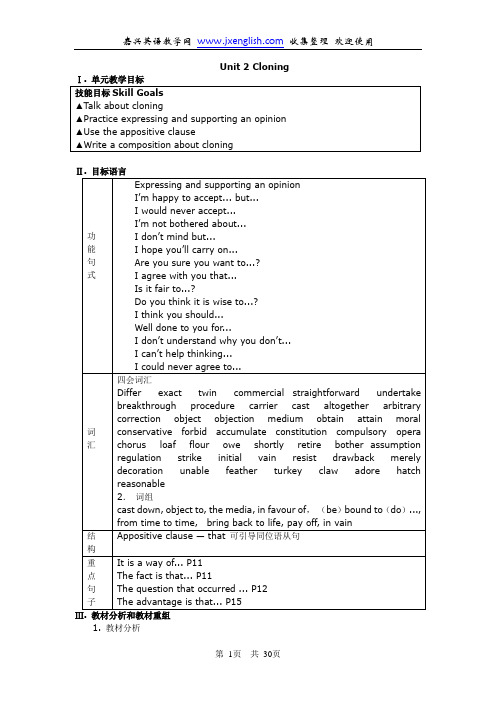
Unit 2 CloningⅢ. 教材分析和教材重组1. 教材分析本单元以Cloning为话题,旨在通过单元教学,使学生了解克隆技术的优缺点,学会表达和支持个人观点,能用所学的有关Cloning的词汇去表述自己对这一新技术的观点和看法。
1.1 Warming Up提供了四幅有关Dolly the sheep(多莉羊),A strawberry plant(草莓植物),Identical dogs(克隆狗) ,Twins(双胞胎婴儿)的图片,让学生用已有的知识和经验讨论对克隆技术的看法与观点。
1.2 Listening是关于人类克隆的听力材料,难度中等。
1.3 Speaking根据材料,四人小组合作,要求把自己对克隆婴儿的态度和感觉用相关的语言表达出来。
语言要得体,锻炼语段表达能力。
1.4 Pre-reading是Reading的热身活动,它要求采用与同学讨论交流的方式谈论有关克隆的相关知识。
1.5 Reading是一篇介绍克隆技术的说明文。
1.6 Comprehending第一题所给出的表格让学生根据课文内容列举克隆技术的优缺点;第二题让学生根据所拥有的知识来评价作者的观点;第三题要求学生用自己的语言阐述对克隆技术的观点并给出理由。
1.7 Learning about Language分词汇和语法两部分,其中Discovering useful words and expressions 是根据语境在运用中掌握词汇。
Discovering useful structures 是通过阅读和补全句子来练习。
1.8 Using Language中的Reading,Discussingand writing要求学生先读, 然后再完成四个任务型的作业,即 1. 讨论并回答三个问题;2. 讨论几种已经灭绝的动物,并且讨论哪种动物应该被恢复到这个世界上,并且给出理由;3. Listening and speaking 让学生根据所听到的内容选择并列出文中人物观点。
人教高中英语选修八Unit2Cloning教学设计

Unit2 CloningReading: CLONING: WHERE IS IT LEADING US?教课方案一、教材剖析本单元以Cloning 为话题,旨在经过单元教课,使学生认识克隆技术的优弊端,学会表达和支持个人看法,能用所学的相关Cloning 的词汇去表述自己对这一新技术的看法和见解。
”阅读”( Reading)部分供给的资料CLONING: WHERE IS IT LEADING US?是一篇介绍克隆技术的说明文, 详细介绍了植物与动物克隆的差别,多利羊的出生与死亡及由此引起的争辩。
帮助学生进一步认识克隆的意义在于解决医学上的难题,为人类服务。
从话题内容上剖析,Warming Up与Reading相一致,从教材份量来说,可将Warming Up 和 Reading 整合在一同,设计成一节任务型“阅读课(精读课)”。
二、学情剖析我所带的两个班级的学生英语基础一般,平常较少阅读科学题材的文章, 知识面相对狭小,阅读理解这篇文章仍是有必定难度。
但学生的好奇心和学习接受能力比较强,能够部署学生课前上网或去图书室找出一些相关克隆的资料,并与多媒体相联合简单介绍克隆及克隆技术的一些知识,让学生有了必定的知识准备以利于很好的理解课文。
三、设计理念及教课目的这节课的主要目的是培育学生跳读和细读的阅读技巧,使学生学会正确剖析阅读问题,懂得从文章中找到要点句子摄入必需的信息,找出正确的答案。
我运用多媒体和学生搜寻资料主动参加学习相联合,设计了表格、问答题、判断题和信息整理题。
这不单提升学生的阅读技巧,也教会学生如何办理不一样的阅读问题。
四.教课目的 Teaching goals1. Target language目口号言a.要点词汇和短语clone ,commercial , producer ,undertake , arbitrary , object ,forbid ,ac cumulate ,cast down ,object to ,the media , in favor ofb.要点句子It is a way of⋯.The fact is that⋯.The question that concerned all scientists were:⋯.2. Ability goals能力目标Enable the students to describe cloning: What is the advantages of cloning?What is the problems or dangers of cloning?What is your opinion of cloning?3. Learning ability goals学能目标Help the students learn how to describe cloning.Teaching important points教课要点How to describe cloning.Teaching difficult point教课难点Help the students analyze the writing techniques of the article.Teaching methods教课方法Skimming, task-based method and debate method.Teaching aids教具准备A recorder, a projector and some slides.Teaching procedures & ways教课过程与方式Step 1 Lead-in(3分钟)Show three cartoon pictures about cloning to arise students’interest s, then raise the question:1.What is cloning?2.Do you want to be cloned or not? why?经过展现图片和发问,激发学生对克隆技术的兴趣和气奇心,启迪学生展望课文的内容,以便经过阅读考证自己的推断。
高二英语人教版选修8教案:Unit2CloningPeriod2Word版含解析
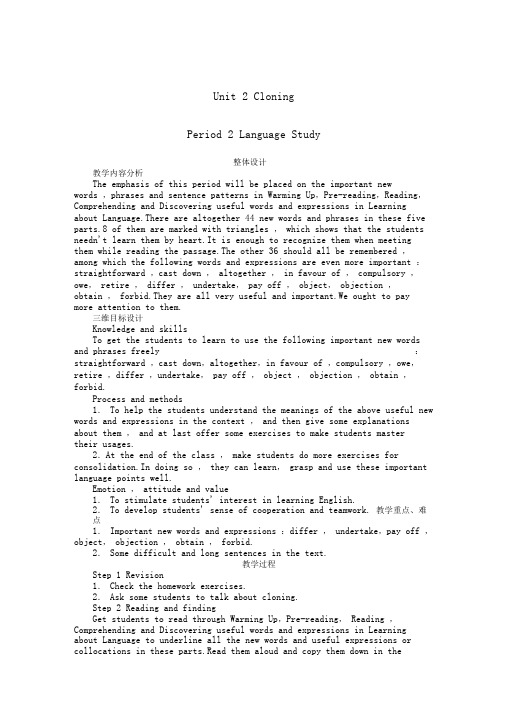
Unit 2 CloningPeriod 2 Language Study整体设计教学内容分析The emphasis of this period will be placed on the important newwords ,phrases and sentence patterns in Warming Up,Pre-reading,Reading,Comprehending and Discovering useful words and expressions in Learning about Language.There are altogether 44 new words and phrases in these five parts.8 of them are marked with triangles ,which shows that the students needn't learn them by heart.It is enough to recognize them when meeting them while reading the passage.The other 36 should all be remembered ,among which the following words and expressions are even more important :straightforward ,cast down ,altogether ,in favour of ,compulsory ,owe,retire ,differ ,undertake,pay off ,object,objection ,obtain ,forbid.They are all very useful and important.We ought to pay more attention to them.三维目标设计Knowledge and skillsTo get the students to learn to use the following important new words and phrases freely :straightforward ,cast down,altogether,in favour of ,compulsory ,owe,retire ,differ ,undertake,pay off ,object ,objection ,obtain ,forbid.Process and methods1.To help the students understand the meanings of the above useful new words and expressions in the context ,and then give some explanations about them ,and at last offer some exercises to make students mastertheir usages.2.At the end of the class ,make students do more exercises for consolidation.In doing so ,they can learn,grasp and use these important language points well.Emotion ,attitude and value1.To stimulate students' interest in learning English.2.To develop students' sense of cooperation and teamwork. 教学重点、难点1.Important new words and expressions :differ ,undertake,pay off ,object,objection ,obtain ,forbid.2.Some difficult and long sentences in the text.教学过程Step 1 Revision1.Check the homework exercises.2.Ask some students to talk about cloning.Step 2 Reading and findingGet students to read through Warming Up,Pre-reading,Reading ,Comprehending and Discovering useful words and expressions in Learning about Language to underline all the new words and useful expressions or collocations in these parts.Read them aloud and copy them down in theexercise book.Step 3 Exercises for useful words and expressions1.Turn to Page 13.Go through the exercises in Discovering useful words and expressions with students and make sure they know what to do.2.Give them several minutes to finish the exercises.They first do them individually ,and then discuss and check them with their partners.3.Check the answers with the whole class and explain the problems they meet where necessary.Step 4 Vocabulary study Ⅰ .简单知识扫描(A 级)1.straightforward (P11)【原句再现】Cloning plants is straightforward while cloning animals is verycomplicated. 克隆植物简单,而克隆动物很复杂。
选修八Unit2Cloning教学设计
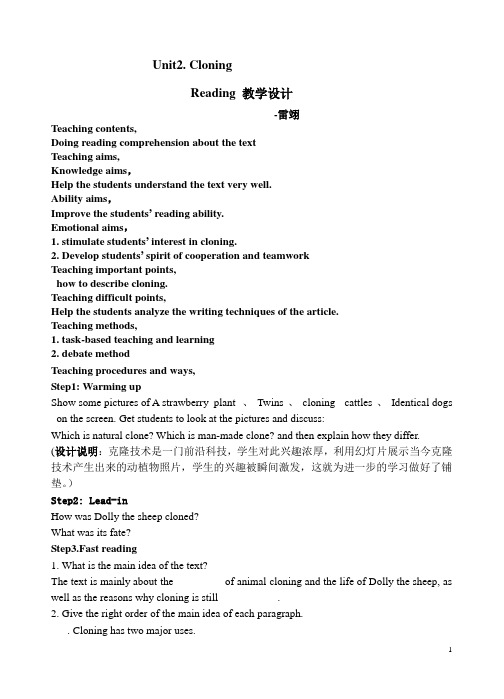
Unit2. CloningReading 教学设计-雷翊Teaching contents,Doing reading comprehension about the textTeaching aims,Knowledge aims,Help the students understand the text very well.Ability aims,Improve the students’ reading ability.Emotional aims,1. stimulate students’ interest in cloning.2. Develop students’ spirit of cooperation and teamworkTeaching important points,how to describe cloning.Teaching difficult points,Help the students analyze the writing techniques of the article.Teaching methods,1. task-based teaching and learning2. debate methodTeaching procedures and ways,Step1: Warming upShow some pictures of A strawberry plant 、Twins、cloning cattles、Identical dogs on the screen. Get students to look at the pictures and discuss:Which is natural clone? Which is man-made clone? and then explain how they differ.(设计说明:克隆技术是一门前沿科技,学生对此兴趣浓厚,利用幻灯片展示当今克隆技术产生出来的动植物照片,学生的兴趣被瞬间激发,这就为进一步的学习做好了铺垫。
[高中英语]2017年高二英语人教版选修8教案:Unit2CloningPeriod2 Word版含解析
Unit 2CloningPeriod 2Language Study整体设计教学内容分析The emphasis of this period will be placed on the important new words,phrases and sentence patterns in Warming Up,Pre-reading,Reading,Comprehending and Discovering useful words and expressions in Learning about Language.There are altogether 44 new words and phrases in these five parts.8 of them are marked with triangles,which shows that the students needn't learn them by heart.It is enough to recognize them when meeting them while reading the passage.The other 36 should all be remembered,among which the following words and expressions are even more important:straightforward,cast down,altogether,in favour of,compulsory,owe,retire,differ,undertake,pay off,object,objection,obtain,forbid.They are all very useful and important.We ought to pay more attention to them.三维目标设计Knowledge and skillsTo get the students to learn to use the following important new words and phrases freely:straightforward,cast down,altogether,in favour of,compulsory,owe,retire,differ,undertake,pay off,object,objection,obtain,forbid.Process and methods1.To help the students understand the meanings of the above useful new words and expressions in the context,and then give some explanations about them,and at last offer some exercises to make students master their usages.2.At the end of the class,make students do more exercises for consolidation.In doing so,they can learn,grasp and use these important language points well.Emotion,attitude and value1.To stimulate students' interest in learning English.2.To develop students' sense of cooperation and teamwork.教学重点、难点1.Important new words and expressions:differ,undertake,pay off,object,objection,obtain,forbid.2.Some difficult and long sentences in the text.教学过程Step 1Revision1.Check the homework exercises.2.Ask some students to talk about cloning.Step 2Reading and findingGet students to read through Warming Up,Pre-reading,Reading,Comprehending and Discovering useful words and expressions in Learning about Language to underline all the new words and useful expressions or collocations in these parts.Read them aloud and copy them down in the exercise book.Step 3Exercises for useful words and expressions1.Turn to Page 13.Go through the exercises in Discovering useful words and expressions with students and make sure they know what to do.2.Give them several minutes to finish the exercises.They first do them individually,and then discuss and check them with their partners.3.Check the answers with the whole class and explain the problems they meet where necessary.Step 4Vocabulary studyⅠ.简单知识扫描(A级)1.straightforward(P11)【原句再现】Cloning plants is straightforward while cloning animals is very complicated.克隆植物简单,而克隆动物很复杂.【观察探究】(1)Installing the program is relatively straightforward.安装这个程序相对比较简单.(2)The report was written in straightforward language.那个报告是用浅显的文字写成的.(3)My father is straightforward in his dealings.我爸爸做买卖(待人)正直.(4)Is this a straightforward route to the beach?这是到海滩去的直道吗?【归纳总结】straightforward adj.简单的,易懂的;坦诚的,坦率的;直的【知识链接】(1)straightforwardly adv.率直地,坦诚地(2)straightforwardness n.率直【即景活用】翻译下列句子(1)I'd like to listen to a straightforward explanation.________________________________________________________________________ (2)Jack is rough,but always straightforward.________________________________________________________________________ (3)She admired his straightforwardness.________________________________________________________________________ Suggested answers:(1)我愿意听率直的解释.(2)杰克很粗野,但却总是很坦诚.(3)她很欣赏他的率直.2.cast down(P12)【原句再现】Cloning scientists were cast_down to find that Dolly's illnesses were more appropriate to a much older animal.研究克隆的科学家发现多莉得的病更容易发生在年老的羊身上,这让他们很沮丧.【观察探究】(1)She was much cast down at the news that she failed in the exam.听到考试失利的消息她非常沮丧.(2)He is not easily cast down.很少见他情绪低落.(3)Don't let yourself be cast down by a small failure in the experiment;try again.别为了实验中的小小失败而垂头丧气,再试下去.【归纳总结】cast down沮丧,不愉快(多用于被动语态)【知识链接】cast v.“扔;投;掷”.如:He cast a stone into the river.他向河中投了一块石子.【即景活用】翻译下列句子(1)不要这么沮丧,打起精神来!________________________________________________________________________ (2)听到这个消息他很沮丧.________________________________________________________________________ Suggested answers:(1)Don't be so cast down.Just keep up your spirits.(2)He was cast down to hear the news.3.altogether(P12)【原句再现】Altogether Dolly lived six and a half years...多莉总共活了6年半……【观察探究】(1)You owe me $68 altogether.你总共欠我68美元.(2)I am altogether on your side in this matter.在这个问题上我完全支持你. (3)Altogether,exports are looking up.总的说来,出口贸易在好转.【归纳总结】altogether adv.总共;完全地;总的说来,总而言之【知识链接】(1)for altogether 永久地;一劳永逸地(2)altogether,all together和together辨析①altogether adv.“总共,完全地;总之,总而言之”.如:He bought altogether 500 hectares of land.他总共买了五百公顷土地.②all together“同时,在一起”,指“全部在同一地方或同一时间”.如:Can you put your books all together in this box?你能将你的书全部一起放在这个箱子里吗?③together adv.“在一起,共同地”.如:All his trouble seemed to come together.他所有的麻烦似乎都一起来了.【即景活用】(1)He's bad-tempered,selfish and ______ an unpopular man.A.therefore B.altogether C.otherwise D.anyhow (2)You'd better put the plates ______ after supper.A.altogether B.in all C.in total D.all together(3)An expert,______ with some assistants,was sent to help in this work. A.together B.altogether C.all together D.therefore Suggested answers:(1)B(2)D(3)A4.in favour of(P12)【原句再现】Is it in_favour_of cloning or against it?是支持克隆还是反对?【观察探究】(1)I have told her about our plan,and she is in favour of it.我对她讲了我们的计划,她表示赞同.(2)Most citizens are now in favour of a cut in tax.绝大多数市民赞成减税.(3)There were 247 votes in favour and 152 against.有247票赞成,152票反对.【归纳总结】in favour(of)赞成;支持【知识链接】(1)in sb.'s favour “对某人有利的(地)”.如:The exchange rate is in our favour at the moment.目前汇率对我们有利.(2)in favour with sb.“受某人支持”.如:She's not in favour with the media just now.目前她没有媒体的支持.(3)do sb.a favour =do a favour for sb.“帮某人忙”.如:Could you do me a favour to pick up Sam from school today?今天你能帮我个忙去学校接萨姆吗?【即景活用】(1)公众舆论正在强烈支持裁军.Public opinion was moving strongly ____________ disarmament.(2)你会赞成还是反对他的意见?Are you ____________ or ______ his opinion?(3)他们争论的结果对李先生有利.The result of their discussion was __________________.Suggested answers:(1)in favour of(2)in favour of,against(3)in Mr.Li's favour 5.compulsory(P13)【原句再现】According to the constitution,it is compulsory for a citizen to undertake military service.根据宪法规定,服兵役是公民的一项义务.【观察探究】(1)I think it is compulsory.我认为这是非做不可的.(2)Education is compulsory for children in most countries.多数国家对儿童实施义务教育.(3)Is English a compulsory subject?英语是必修科目吗?【归纳总结】compulsory adj.必须做的;义务的;强制的;强迫的;必修的【即景活用】(1)我国实行义务兵役制.We have a ________________ military service system in our country.(2)英国实行义务教育.________________________________________ in Britain.Suggested answers:(1)compulsory(2)Education is compulsory6.owe(P13)【原句再现】You owe the lady an apology.你欠这位女士一个道歉.【观察探究】(1)I owe the landlord one hundred dollars.(=I owe one hundred dollars to the landlord.)我欠房东一百美元.(2)We owe to Newton the principle of gravitation.我们全靠牛顿才知道引力的原理.【归纳总结】owe vt.欠(债、账、钱、人情等);归功于……【即景活用】你应该给自己安排个假期.You ______ ______a holiday.Suggested answer:owe yourself7.retire(P13)【原句再现】...when he retired he would be able to look back on his life with satisfaction.……当他退休的时候,他能够满意地回顾自己的生活.【观察探究】(1)Mr.Weller retired last month and now lives at his ease.韦勒先生上个月退休了,现在过着悠闲的生活.(2)The general retired as soon as he reached sixty.那位将军一到六十岁就退役了.(3)She retired to the country.她退隐到乡下去了.【归纳总结】retire vi.退休;退役;隐退【即景活用】我爷爷是一位退休工人.My grandpa is a ______ ______.Suggested answer:retired workerⅡ.重点知识探究(B级)1.differ(P10)【原句再现】Think about how they differ.考虑一下它们有什么不同.【观察探究】(1)Customs differ in different countries.各国风俗不同.(2)We differ about the matter.我们在这件事情上意见不同.(3)I am sorry to say that I differ with you about/on/over that.对不起,在那一点上我与你意见不同.(4)His opinion differs entirely from mine.他的意见和我的完全不同.【归纳总结】differ vi.不同,相异,不同意,持不同看法differ(with sb.)about/on/over sth.(与某人)在某方面意见不同differ from与……不同【知识链接】(1)agree to differ 求同存异(2)difference n.不同,差异make a difference 起作用;发生影响(3)different adj.不同的,不一样的be different from与……不同【即景活用】(1)完成句子①My new school is very ______ ______(与……不同)the old one.②In this respect French ______ ______(与……不同)English.③There are many ______(不同)between the two languages.④There was not really much ____________(不同)in their points of view.(2)选择最佳答案Leaves are found on all kinds of trees,but they differ greatly ______ size and shape. A.on B.from C.by D.inSuggested answers:(1)①different from②differs from③differences④difference (2)D2.undertake(P11)【原句再现】It is a difficult task to undertake.那干起来是一件困难的工作.【观察探究】(1)She undertook the organization of the whole scheme.她负责整个计划的组织工作.(2)Who do you think is the right person to undertake the post?你认为谁是担任这个职位的合适人选?(3)He undertook to be here at ten o'clock.他答应十点钟到这儿来.【归纳总结】undertake vi.(undertook,undertaken)着手,从事;负责,承担;答应,承诺undertake to do sth.答应/承诺做某事【知识链接】undertaking n.任务;事业;企业【即景活用】完成句子(1)She herself ____________(承担)the preparation of the room.(2)He undertook __________________ at five.(他答应五点钟到这里来.)Suggested answers:(1)undertook(2)to be here3.pay off(P11)【原句再现】But at last the determination and patience of the scientists paid_off in 1996 with a breakthrough—the cloning of Dolly the sheep.但是,决心和耐心使科学家们最终于1996年收获了突破性的结果——克隆羊“多莉”.【观察探究】(1)John studied hard before the examination,and it paid off.约翰考试前学习很刻苦,这得到了回报.(2)It took them three years to pay off their debts.他们用了3年才还清了债务.【归纳总结】pay off 得到好结果,取得成功;偿清【知识链接】(1)pay for “为……付钱;为……付出代价”.如:If you don't work hard now,you'll pay for it later when you fail your exams.你现在不好好学习,到考试不及格时就得为此付出代价.(2)pay back 偿还,报复(3)pay out 花费;支出(4)pay up(不情愿地)付清;还清(债务)【即景活用】(1)He worked hard before the College Entrance Examination,and it ______.His dream of going to college came true.A.showed off B.paid off C.put off D.took off(2)He borrowed $1000 from the bank and was given ten months to ______the loan.A.pay back B.pay for C.pay off D.pay in(3)翻译:I'll pay him back for treating me like that.______________________________ Suggested answers:(1)B(2)A(3)他那么对待我,我会报复他的.4.objection(P12)【原句再现】On the other hand,Dolly's appearance raised a storm of objections...另一方面,多莉羊的出现引起了强烈的反对……【观察探究】(1)I have/take/make no objection to their plan.我不反对他们的计划.(2)No objections were raised at the time.当时没人提出异议.【归纳总结】objection n.反对,不赞成have/take/make an objection to(doing)sth.对……表示反对raise an objection/objections to sth.对……提出异议【知识链接】(1)object vi.意为“不赞成,反对”.object常与介词to连用,构成短语object to(doing)sth.意为“反对(做)某事”.如:No one objected to the plan.没有人反对这项计划.We objected to leaving in such a hurry.我们反对这样匆忙地离开.The students objected to being treated like children.学生们反对像对待孩子似地对待他们.(2)object还可用作名词,意为“物体,物品;目的;目标;宾语”.如:I saw an object in the sky,but I didn't know what it was.我看见天空中有个物体,可是我不知道它是什么.I only want to buy some common household objects here.我只是想在这儿买些普通家庭用品.His object of studying English is to know more about England and the English people.他学习英语的目的是更多地了解英国和英国人民.Her sole object in life is to become a travel writer.她人生的唯一目标就是当游记作家.(3)表示“反对,不赞成”的词语还有:oppose,be opposed to,be against,argue against,disapprove 等.【即景活用】(1)Many teachers strongly object to ______ at school.A.smoke B.smoking C.smoked D.having smoked(2)We ______ to punishing a whole group for one person's fault.A.complain B.object C.oppose D.resistSuggested answers:(1)B(2)B5.obtain(P12)【原句再现】Although at present human egg cells and embryos needed for cloning research are difficult to obtain,newspapers wrote of evil leaders hoping to clone themselves to attain their ambitions.尽管目前克隆研究所需要的人类卵细胞和胚胎很难获得,但据报载,有些罪恶的领导人希望克隆自己以实现他们的野心.【观察探究】(1)She has to obtain her parents' permission before she does anything.她在做任何事情之前必须得到父母的允许.(2)The scientists wished to obtain the first-hand information by talking with the farmers.科学家们希望通过和农民交谈得到第一手资料.(3)Details can be obtained from the Department for Education.可以从教育部获知详情.【归纳总结】obtain vt.获得;赢得obtain sth.by doing sth.通过做某事获取某物obtain sth.from sb./sth.从某人/物处获得/获取某物【知识链接】obtain,attain,get,gain,earn,win辨析.(1)obtain vt.应用范围较广,指经过买、借、拿等“获得,得到”某物.含有“如期地达到目的或得到所希望的东西”之意.如:He always manages to obtain what he wants.他总是设法得到他想要的东西.(2)attain vt.指经过努力“获得”.如:Leo Ioacoco attained the position of President of the Ford Motors.李·雅科卡终于当上了福特汽车公司的总裁.(3)get vt.最常用,可指主动去“获得,得到”,有时指不一定需要主动性或付出很大努力就能“得到”,甚至可能是被迫“接受”.如:Did they get any compensation when they were dismissed from their jobs?他们被解雇时有没有得到赔偿费?She got a bad cold yesterday.她昨天得了重感冒.(4)gain vt.指通过斗争、竞争或付出劳动而获得某种优势或达到某种目的.其宾语通常是经验、优势、利益、好处等.如:She gained rich experience in teaching.她获得了丰富的教学经验.Only after ten years in the country did she gain her citizenship.她在这个国家住了十年后才取得了公民身份.(5)earn vt.表示经过艰苦努力而得到报酬,或得到了理应享有的某种待遇,其宾语多为金钱、荣誉等.如:He earns wages of 800 dollars a month.他月薪八百美元.(6)win v.多指在竞赛中“获得,赢得”,有时也用于指在战争中“获得”胜利,宾语通常是比赛、战斗、战争等.如:They won the basketball match.他们打赢了这场篮球赛.【即景活用】No one can ______ great achievements unless he concentrates on what he is doing,even though a talent.A.attain B.attract C.apply D.obtainSuggested answer:A6.forbid(P12)【原句再现】Some began to reform their legal systems and forbade research into human cloning...一些国家开始修改法律体系,禁止克隆人的研究……【观察探究】(1)The government forbade the meeting.政府禁止举行这次会议.(2)His parents forbid him wine.他的父母不准他喝酒.(3)The law forbids smoking in public buildings.法律禁止在公共场所吸烟.(4)The teacher forbade us to leave our seats.老师不允许我们离开座位.(5)Women are forbidden from going out without a veil in that country.在那个国家,妇女不戴面纱禁止外出.(6)It's forbidden to marry someone who is not a member of the same faith.禁止与宗教信仰不同的人结婚.【归纳总结】forbid(forbade;forbidden)vt.禁止;不准forbid sth.禁止某事forbid sb.sth.禁止某人干某事forbid doing sth.禁止干某事forbid sb.to do sth.禁止某人干某事forbid sb.from doing...禁止某人做……It's forbidden to do sth.做某事是被禁止的【知识链接】forbid后面接动名词作宾语,但接不定式作宾语补足语,类似的动词还有:consider,advise,allow,permit等.【即景活用】(1)To spend a pleasant festival,people ______ off fireworks during the last Spring Festival.A.didn't forbid to set B.were not forbidden to setC.didn't forbid setting D.were not forbidden setting(2)他禁止在办公时间吸烟.________________________________________________________________________ Suggested answers:(1)B(2)He forbade smoking in the office.Step 5Using words and expressionsTurn to Page 55.Ask students to do the exercises in Using Words and Expressions in the Workbook.The following procedures may be followed:1.Go through the three exercises with students and make sure they know what to do.2.Several minutes for students to finish them individually.3.Check the answers with the whole class.Step 6Homework1.Finish off the Workbook exercises.Do Exercise 3 in your exercise book.2.Learn the useful new words and expressions by heart.Step 7Reflection after teaching________________________________________________________________________ ________________________________________________________________________。
人教新课标高二英语选修八教案:Unit2+Cloning+Reading.doc
Unit 2 CloningPeriod 2 ReadingTeaching aims:Enable the students to describe cloning:What is the advantages of cloning?What is the problems or dangers of cloning?What is their opinion of cloning?Teaching important and difficult points:Learn What the advantages of cloning are, what the problems or dangers of cloning are, what their opinion of cloning is?Teaching methods:Fast and careful reading, asking, answering.Teaching aids:A blackboard and a computerTeaching procedures:Step 1 Fast reading: What’s the text mainly about?It’s mainly about cloning arguments about animal cloning and concerns about its future.Step 2 Read again and find the main ideas of the five paragraphs. Read through the passage and get the main idea.•Para 1:What’s cloning? ( It is a way of making an exact copy of another animal and plant)•Para 2:Cloning has two major uses.•Para 3:The problems of Dolly.•Para 4:The effect of Dolly.•Para 5:It is forbidden to clone human being.Step3 Read again and answer these questions1. What are the two major uses of cloning ?2. Why is it easier to make commercial plant clones than animal clones?3. What was the first clone from an adult animal? At what age did this clone die?4. Why is cloning controversial in some countries?Step 4 Fill in the chart using the information from the text.Step5. Show the students how to clone a sheep with a picture.Step6.What do you think is the writer’s point of view in this reading passage? Is it in favour of cloning or against it?I think the writer is______________because___________________________________________________ Step 7 Homework1. Finish “Learning about language” Discovering useful words and expressions on page 13.2. Underline the sentences yo u don’t understand.品味人生1、不管鸟的翅膀多么完美,如果不凭借空气,鸟就永远飞不到高空。
人教英语选修八Unit2Cloning教案2
Unit 2 CloningThe Second Period ListeningTeaching goals1. Target languagea. 词汇和短语cloning, attitude, medicine, organsb. 重点句子I agree with...How would you do...?Do you think...?2. Ability goalsLet the students focus on the different attitude towards cloning technology.3. Learning ability goalsTeach the students how to get the specific information.Teaching important pointsListen to the materials about cloning and choose the correct answers.Teaching difficult pointsWork together with partners and show their own opinions.Teaching methodsListening and cooperative learning.Teaching aidsA tape recorder.Teaching procedures & waysStep I Revision1. Greetings2. RevisionStep Ⅱ Pre-listeningWork in groups to discuss how we should behave towards the human clones.T: Before human clones become part of our life, perhaps we should spend some time thinking about how we should behave towards them. Now, work in groups to discuss the following questions.Show the following.1. How would you treat human clones?2. Do you think they should have legal and political rights, such as getting married or voting?3. Do you think they are separate people or part of the original donor?Sample answers:1. I will treat them as normal people.2. Yes, I think they should have the legal and political rights.3. I think they are separate people.Step Ⅲ ListeningThe students are asked to read fast the questions and multiple answers to find out the listening points first, and then listen to the tape twice to choose the best answer.T: Please open your books at page 54. Before you listen to the tape, please read fast the questions and multiple answers to find out the listening points. Pay more attention to these important points while listening. While listening, you’d better make notes of the listening points.A few minutes later.T: Now, I’ll play the ta pe twice. Please listen carefully and pay more attention to the important points. You may make notes while listening. Notes taking are helpful for you to remember each of the important points. After listening twice, check the answers and explain some difficult listening points if necessary.Step Ⅳ Listening task (P57) (时间不足时改为作业)First, ask the students to read these sentences and then listen to the tape and decide if they are facts or opinions.T: Now turn to page 57, there’re 10 questions. You should for m the habit of going through the questions and the answers to get the important listening points. Yes? And make notes if necessary. OK?Play the recording and then check the answers with the class.Sample answers:Arguments for cloning pets:1. Favorite pets can live forever as clones.2. It is moral to clone pets for their owners.Arguments against cloning pets:1. Many people don’t agree with cloning.2. Some people think that cloning pets is selfish.HomeworkT: Boys and girls, today we have listened to some materials about cloning. I do hope you can listen to the materials again after class so that you can get very familiar with them. Besides, please preview the reading. Now class is over. Goodbye, everyone. Ss: Goodbye, sir / madam.。
人教版高中英语选修8《Unit2Cloning》教案
人教版高中英语选修8《Unit 2 Cloning》教案人教版高中英语选修8《Unit 2 Cloning》教案【一】教学准备教学目标一、语言知识目标初步理解、掌握课文中关于克隆的词汇,学习分析课文中的长难句子。
二、阅读技能目标1. 能获取和处理文章中的主要信息。
2. 能够掌握文中出现的重要的语言知识三、学习策略目标掌握速读、略读、猜测词义等阅读策略。
四、情感态度目标让学生认识到克隆的利和弊。
五、文化意识目标了解克隆,正确地利用克隆技术来为人类服务。
教学重难点初步理解、掌握课文中关于克隆的词汇,学习分析课文中的长难句子。
教学过程Step 1 Daily reportOne student comes to the front and gives a report about advantages and disadvantages of science and technology.Step 2 leading-inThe teacher shows some pictures and starts a discussion about cloning.Step 3 SkimmingTask 1: Whats the main idea of the passage? Task 2: Match the main idea with each paragraph Para 1: A. Peoples attitude towards cloning. Para 2: B. The problems of Dolly.Para 3: C. The impact of Dolly.Para 4: D. Two major uses and the procedure of cloning.Para 5: E. The definition(定义)of cloning.Step 4 ScanningTask 1. Look through Para 2 and answer the following questions.(1) What are the two major uses of cloning?(2) Which one is easier, to make plant clones or animal clones?Task 2. Look through Para 3 and fill in the chart. Task 3. Do the following translation and word guessing.(1). Translation:On the other hand, Dollys appearance raised a storm of objections and had a great impact on the media and public imagination.(2). The word controversial in paragraph 4 probably means_________.A. complicatedB. arguableC. importantD. valuableTask4. Do the following Tor F questions based on Paragraph 5.1. People feared some evil leaders might use cloning to reach their goal.2. All the research into cloning will be forbidden.3. Religious leaders are in favor of human cloning.Step 5 Enjoy beautiful sentences1. Cloning plants is straightforward while cloning animals is very complicated.2. At last the determination and patience of the scientists paid off.3. The fact that she seemed to develop normally was very encouraging.Step 6 Question and answerThis part is for students to find if they still have questions. If there is any, they can ask their classmates to help them.Step 7 QuizNote: This part is very challenging. In the picture there are five numbers. Students can choose their lucky number and answer questions. Most of the questions are based on what they have learned in class.Step 8. Test yourselfFill in the blank with proper words.Cloning is a way of _______ (make) an exact copy of another animal or plant. It has two major uses. One is _______ gardeners use it to produce plants. The ______ is that it is valuable for medical research on animals. ________, the process of cloning is difficult ___________ (undertake).The first successful clone, Dolly the sheep, made the whole _________ (science) world follow its progress, though it had ________ problems than the normal sheep. On the other hand, Dollys appearance _______ (raise) a storm of objections and had a great impact ______ the media and public imagination. Different people have different opinions on it. However, scientists still wonder ______ cloning will help or harm us and where it is leading us.Step 9 DebateTopic: Are you for or against cloning?课后小结HomeworkWrite a passage entitled My view on cloning.课后习题评测练习主要有两个。
- 1、下载文档前请自行甄别文档内容的完整性,平台不提供额外的编辑、内容补充、找答案等附加服务。
- 2、"仅部分预览"的文档,不可在线预览部分如存在完整性等问题,可反馈申请退款(可完整预览的文档不适用该条件!)。
- 3、如文档侵犯您的权益,请联系客服反馈,我们会尽快为您处理(人工客服工作时间:9:00-18:30)。
Unit 2CloningPeriod 2Language Study整体设计教学内容分析The emphasis of this period will be placed on the important new words,phrases and sentence patterns in Warming Up,Pre-reading,Reading,Comprehending and Discovering useful words and expressions in Learning about Language.There are altogether 44 new words and phrases in these five parts.8 of them are marked with triangles,which shows that the students needn't learn them by heart.It is enough to recognize them when meeting them while reading the passage.The other 36 should all be remembered,among which the following words and expressions are even more important:straightforward,cast down,altogether,in favour of,compulsory,owe,retire,differ,undertake,pay off,object,objection,obtain,forbid.They are all very useful and important.We ought to pay more attention to them.三维目标设计Knowledge and skillsTo get the students to learn to use the following important new words and phrases freely:straightforward,cast down,altogether,in favour of,compulsory,owe,retire,differ,undertake,pay off,object,objection,obtain,forbid.Process and methods1.To help the students understand the meanings of the above useful new words and expressions in the context,and then give some explanations about them,and at last offer some exercises to make students master their usages.2.At the end of the class,make students do more exercises for consolidation.In doing so,they can learn,grasp and use these important language points well.Emotion,attitude and value1.To stimulate students' interest in learning English.2.To develop students' sense of cooperation and teamwork.教学重点、难点1.Important new words and expressions:differ,undertake,pay off,object,objection,obtain,forbid.2.Some difficult and long sentences in the text.教学过程Step 1Revision1.Check the homework exercises.2.Ask some students to talk about cloning.Step 2Reading and findingGet students to read through Warming Up,Pre-reading,Reading,Comprehending and Discovering useful words and expressions in Learning about Language to underline all the new words and useful expressions or collocations in these parts.Read them aloud and copy them down in the exercise book.Step 3Exercises for useful words and expressions1.Turn to Page 13.Go through the exercises in Discovering useful words and expressions with students and make sure they know what to do.2.Give them several minutes to finish the exercises.They first do them individually,and then discuss and check them with their partners.3.Check the answers with the whole class and explain the problems they meet wherenecessary.Step 4Vocabulary studyⅠ.简单知识扫描(A级)1.straightforward(P11)【原句再现】Cloning plants is straightforward while cloning animals is very complicated.克隆植物简单,而克隆动物很复杂。
【观察探究】(1)Installing the program is relatively straightforward.安装这个程序相对比较简单。
(2)The report was written in straightforward language.那个报告是用浅显的文字写成的。
(3)My father is straightforward in his dealings.我爸爸做买卖(待人)正直。
(4)Is this a straightforward route to the beach?这是到海滩去的直道吗?【归纳总结】straightforward adj.简单的,易懂的;坦诚的,坦率的;直的【知识链接】(1)straightforwardly adv.率直地,坦诚地(2)straightforwardness n.率直【即景活用】翻译下列句子(1)I'd like to listen to a straightforward explanation.________________________________________________________________________ (2)Jack is rough,but always straightforward.________________________________________________________________________ (3)She admired his straightforwardness.________________________________________________________________________ Suggested answers:(1)我愿意听率直的解释。
(2)杰克很粗野,但却总是很坦诚。
(3)她很欣赏他的率直。
2.cast down(P12)【原句再现】Cloning scientists were cast_down to find that Dolly's illnesses were more appropriate to a much older animal.研究克隆的科学家发现多莉得的病更容易发生在年老的羊身上,这让他们很沮丧。
【观察探究】(1)She was much cast down at the news that she failed in the exam.听到考试失利的消息她非常沮丧。
(2)He is not easily cast down.很少见他情绪低落。
(3)Don't let yourself be cast down by a small failure in the experiment;try again.别为了实验中的小小失败而垂头丧气,再试下去。
【归纳总结】cast down沮丧,不愉快(多用于被动语态)【知识链接】cast v.“扔;投;掷”。
如:He cast a stone into the river.他向河中投了一块石子。
【即景活用】翻译下列句子(1)不要这么沮丧,打起精神来!________________________________________________________________________ (2)听到这个消息他很沮丧。
________________________________________________________________________ Suggested answers:(1)Don't be so cast down.Just keep up your spirits.(2)He was cast down to hear the news.3.altogether(P12)【原句再现】Altogether Dolly lived six and a half years...多莉总共活了6年半……【观察探究】(1)You owe me $68 altogether.你总共欠我68美元。
